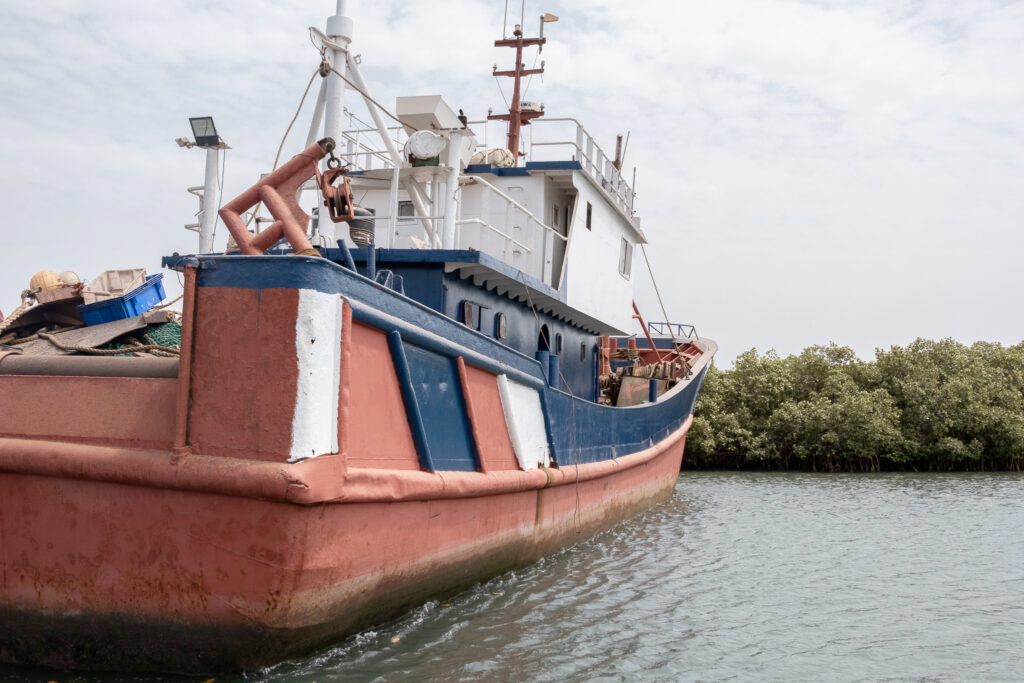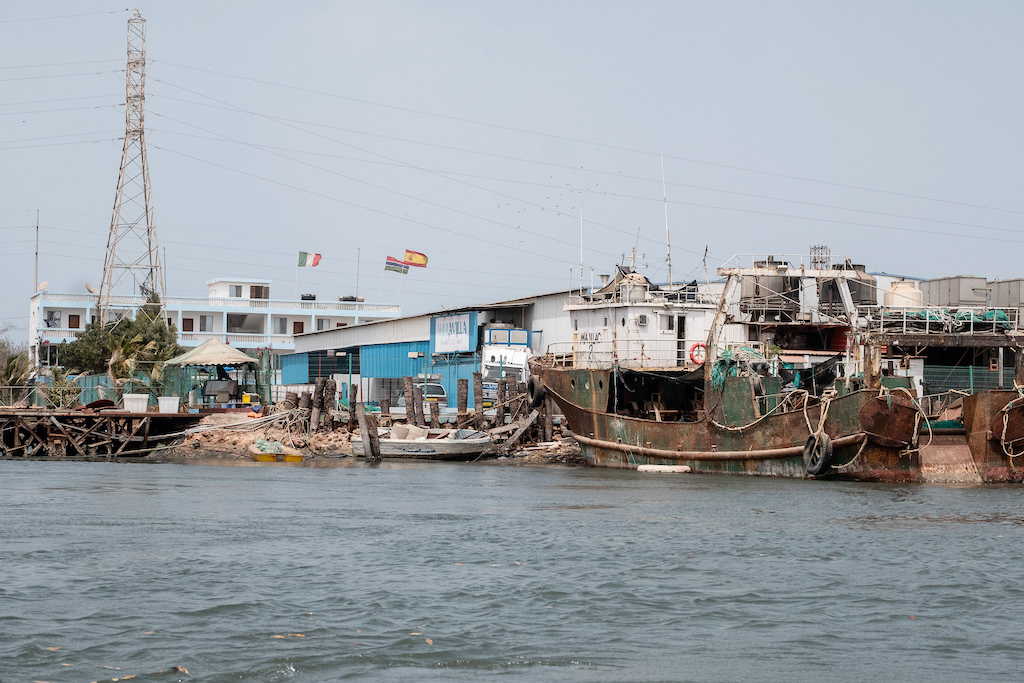Gambiaj.com – (BANJUL, The Gambia) – A year-long investigation has revealed how a fleet of Chinese-controlled industrial trawlers operating in Gambian waters has been catching fish illegally and feeding a European seafood supply chain, despite repeated warnings and deadly consequences for artisanal fishing communities.
The probe centers on the Majilac fleet, a group of trawlers linked to Chinese and Gambian shareholders, and its ties to Hansen Seafood, a processing plant in Banjul owned by the Spanish conglomerate Congelados Maravilla.
Evidence gathered from satellite tracking, shipping records, and testimony shows that for years the Majilac vessels have trespassed into The Gambia’s inshore artisanal zone, using illegal fine-mesh nets to harvest juvenile species and supplying catches later exported to Spain, Italy, and Portugal.
A Deadly Night at Sea
The human cost of this competition was laid bare on the night of 7–8 March 2024, when the Majilac 6 struck a wooden canoe carrying four Senegalese fishermen near How Ba beach. The steel trawler did not stop.
Two crew members drowned instantly. Fourteen-year-old Bubacarr M’Baye survived only by clinging to the shattered hull for hours. His cousin Assan, 25, slipped away into the waves before dawn.
No charges have been brought against the owners or captain of the Majilac 6.

Local fishing communities say such collisions are increasing as industrial vessels move closer to shore in search of dwindling fish stocks. “These trawlers are a menace,” said Omar Gaye of the Gambian Artisanal Fishermen’s Association. “They destroy nets, they destroy livelihoods, and sometimes they kill. Nothing happens to them.”
Illegal Operations Hidden in Plain Sight
Under Gambian law, the first nine nautical miles from the coast are reserved exclusively for artisanal fishing. But satellite data from Global Fishing Watch shows at least four Majilac vessels repeatedly operating inside the restricted zone in recent years.
After hauling in their catches, the trawlers do not always land at the main port. Instead, they regularly dock at a quiet secondary quay used by Hansen Seafood. There, the fish is processed, frozen, and packaged for commercial export.
Congelados Maravilla, one of Galicia’s major seafood suppliers to European markets, bought Hansen Seafood in 2022. The company denies owning the Majilac vessels and says it stopped buying fish from the fleet last year.
But it acknowledges previously exporting their catch, describing it as part of contracts it inherited during the acquisition.
Customs records show that in 2023 alone, at least 520 tonnes of frozen fish processed at Hansen Seafood were shipped to Spain, much of it routed through Portugal.
The European market value of the exports is unknown, but to Gambian coastal communities, the real cost is visible daily.
Ethical and Legal Doubts Around EU Imports
Under European law, all imported fish must carry “catch certificates” guaranteeing it was not caught illegally. Those certificates are issued by the exporting country, in this case, The Gambia.
However, environmental groups say the system is being routinely undermined. Trawlers caught fishing illegally are frequently released after paying fines, only to resume the same activity weeks later.
During a joint enforcement patrol in March 2024, the Gambian navy and Sea Shepherd detained seven trawlers operating illegally inshore, four of them belonging to the Majilac fleet. All were found using banned fine-mesh nets that sweep up fish too young to replenish stocks.
Yet the same vessels have since returned to the same waters and continue unloading at Hansen Seafood’s dock, satellite data and field observation confirm.
Europe’s Appetite, West Africa’s Loss
The stakes extend far beyond The Gambia. West Africa is one of the global epicenters of illegal, unreported, and unregulated fishing, representing an estimated 40% of global IUU catches and costing African nations more than $9 billion annually.
As fish stocks collapse, artisanal fishers are pushed farther out to sea to survive. Many end up risking everything again, this time by boarding small boats bound for Europe.
“Fishing used to feed us,” said Mussa M’Baye, owner of the canoe destroyed in the Majilac 6 collision. “Now it is taking our sons away, either to the sea or across it.”
No Accountability, No End in Sight
Despite the clear evidence of illegal incursions, vessel flight from accident scenes, and direct links to European supply chains, neither the Majilac Fishing Company nor their European buyers have faced criminal sanctions.
Meanwhile, teenage survivor Bubacarr has returned to fishing, trying to earn a living in waters where industrial steel increasingly overpowers wood and hand-woven nets.
For now, the Majilac trawlers continue to fish. The exports continue to Europe. And the families in Sanyang, Tanji and Saint Louis continue to bury their dead.










